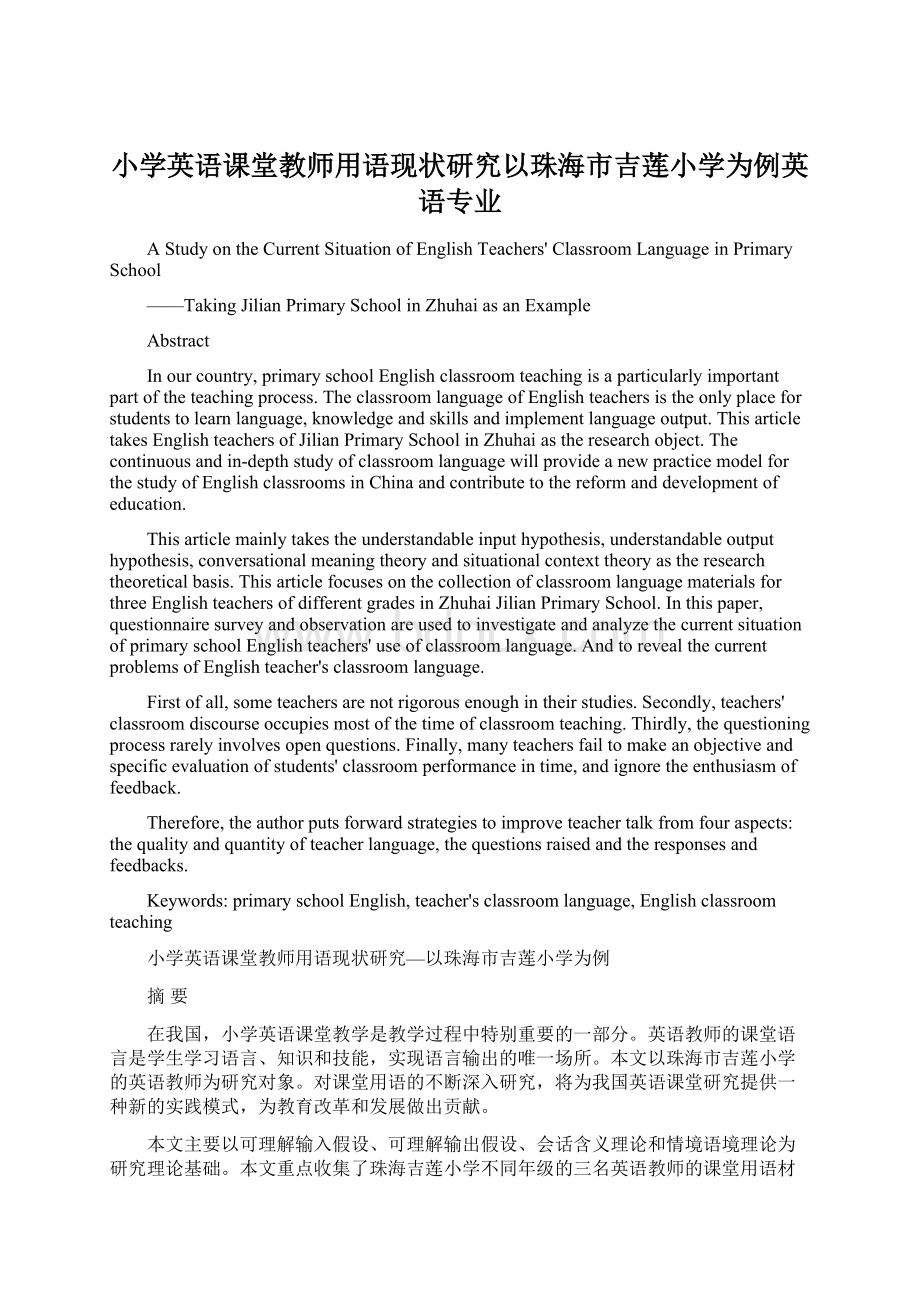小学英语课堂教师用语现状研究以珠海市吉莲小学为例英语专业.docx
《小学英语课堂教师用语现状研究以珠海市吉莲小学为例英语专业.docx》由会员分享,可在线阅读,更多相关《小学英语课堂教师用语现状研究以珠海市吉莲小学为例英语专业.docx(30页珍藏版)》请在冰豆网上搜索。

小学英语课堂教师用语现状研究以珠海市吉莲小学为例英语专业
AStudyontheCurrentSituationofEnglishTeachers'ClassroomLanguageinPrimarySchool
——TakingJilianPrimarySchoolinZhuhaiasanExample
Abstract
Inourcountry,primaryschoolEnglishclassroomteachingisaparticularlyimportantpartoftheteachingprocess.TheclassroomlanguageofEnglishteachersistheonlyplaceforstudentstolearnlanguage,knowledgeandskillsandimplementlanguageoutput.ThisarticletakesEnglishteachersofJilianPrimarySchoolinZhuhaiastheresearchobject.Thecontinuousandin-depthstudyofclassroomlanguagewillprovideanewpracticemodelforthestudyofEnglishclassroomsinChinaandcontributetothereformanddevelopmentofeducation.
Thisarticlemainlytakestheunderstandableinputhypothesis,understandableoutputhypothesis,conversationalmeaningtheoryandsituationalcontexttheoryastheresearchtheoreticalbasis.ThisarticlefocusesonthecollectionofclassroomlanguagematerialsforthreeEnglishteachersofdifferentgradesinZhuhaiJilianPrimarySchool.Inthispaper,questionnairesurveyandobservationareusedtoinvestigateandanalyzethecurrentsituationofprimaryschoolEnglishteachers'useofclassroomlanguage.AndtorevealthecurrentproblemsofEnglishteacher'sclassroomlanguage.
Firstofall,someteachersarenotrigorousenoughintheirstudies.Secondly,teachers'classroomdiscourseoccupiesmostofthetimeofclassroomteaching.Thirdly,thequestioningprocessrarelyinvolvesopenquestions.Finally,manyteachersfailtomakeanobjectiveandspecificevaluationofstudents'classroomperformanceintime,andignoretheenthusiasmoffeedback.
Therefore,theauthorputsforwardstrategiestoimproveteachertalkfromfouraspects:
thequalityandquantityofteacherlanguage,thequestionsraisedandtheresponsesandfeedbacks.
Keywords:
primaryschoolEnglish,teacher'sclassroomlanguage,Englishclassroomteaching
小学英语课堂教师用语现状研究—以珠海市吉莲小学为例
摘要
在我国,小学英语课堂教学是教学过程中特别重要的一部分。
英语教师的课堂语言是学生学习语言、知识和技能,实现语言输出的唯一场所。
本文以珠海市吉莲小学的英语教师为研究对象。
对课堂用语的不断深入研究,将为我国英语课堂研究提供一种新的实践模式,为教育改革和发展做出贡献。
本文主要以可理解输入假设、可理解输出假设、会话含义理论和情境语境理论为研究理论基础。
本文重点收集了珠海吉莲小学不同年级的三名英语教师的课堂用语材料。
本文采用问卷调查法、观察法对小学阶段英语教师课堂用语的使用现状进行调查分析,揭示当前英语教师课堂用语所存在的问题。
一是部分教师学习不够严谨。
其次,教师课堂话语占据了课堂教学的大部分时间。
第三,提问过程很少涉及开放性问题。
最后,许多教师未能及时对学生的课堂表现做出客观、具体的评价,忽视了反馈的积极性。
因此,笔者从教师语言的质量、数量、所提问题和回答反馈四个方面提出了改进教师话语的策略。
关键词:
小学英语;英语教师课堂用语;英语课堂教学
Contents
AbstractⅠ
摘要Ⅱ
Introduction1
1LiteratureReview3
1.1LiteratureReviewatAbroad3
1.2LiteratureReviewatHome4
2BasicTheoreticalFoundation6
2.1LanguageInputTheory6
2.2RelevanceTheory7
2.3ConversationalImplicationTheory8
2.4SituationContextTheory8
3ResearchMethodology10
3.1ResearchQuestions10
3.2ResearchMethod10
3.2.1Questionnaire...11
3.2.2ClassroomObservation11
3.2.3Subjects12
4DataAnalysisandResultsAnalysis13
4.1AnAnalysisoftheCurrentSituationofTeachers'ClassroomDiscourseQuantity13
4.1.1TheNumberofEnglishTeachers'ClassroomDiscourse13
4.1.2TheTimeTakenUpbyStudents'ClassroomDiscourse15
4.2AnalysisoftheCurrentSituationofTeachers'ClassroomDiscourseQuality16
4.2.1TheAccuracyofTeachers'ClassroomDiscourse16
4.2.2TheFluencyofTeachers'ClassroomDiscourse16
4.2.3TheInterestofTeachers'ClassroomDiscourse17
4.2.4TheEnthusiasmofTeachers'ClassroomDiscourse18
4.3AnAnalysisofthePresentSituationofTeachers'Questions19
4.3.1QuestionType19
4.3.2TheObjectofQuestions20
4.4AnAnalysisoftheCurrentSituationofTeachers'ClassroomFeedback21
4.4.1Teachers'EnthusiasmforClassroomDiscourseFeedback22
5MajorFindingsandSuggestions23
5.1MajorFindings23
5.2MajorSuggestions25
Conclusion27
References28
AppendixI30
AppendixII33
Acknowledgments37
Introduction
Theinitialmotivationofthetopicselectioniscloselyrelatedtotheresearcher'spersonalgrowthandlifeexperience.Influencedbypersonallifeexperienceandpracticalexperience,theauthorchoosesprimaryschoolEnglishteachersastheresearchobject.TheauthorstudiesEnglisheducationintheUniversity,andtheinternshippositionisEnglishteacher,sowantstoknowmoreabouttoday'sprimaryschoolEnglishteacher.
Withtherapidprogressanddiversifieddevelopmentofmodernsociety,theimportanceofEnglishasauniversallanguageisobvious.Englishplaysanimportantrolebetweenteachersandstudents.First,itisthesecondlanguagethatstudentsmustmasterexcepttheirmothertongue;second,itisatoollanguageusedbetweenteachersandstudentsintheclassroom.
Ontheonehand,everyclasshascertainteachinggoalsforEnglishknowledgeandability.Ontheotherhand,teachersalsoexplainlanguageknowledgethroughEnglish,cultivatestudents'variousabilities,expresstheiropinionsandcommunicatewithstudents.Inthisprocess,teachersandstudentsbothhavedeveloped.
Languageandspeechactsareboththeinnerexpressionofcultureandtheboatcarryingculture.Asaforeignlanguage,Englishbringsusanewforeignculture-Englishnationalculture.ForChinesestudents,Englishisabrand-newculturalelement.TheimpactofthisculturaldifferenceonprimaryschoolEnglishteachersandeducationandteachingshouldbeseriouslyreflectedbyresearchers.
Thisarticleattemptstoclarifytheconceptofteachers'classroomlanguage.Thisarticleattemptstoclassifyteachers'classroomlanguagemorescientifically,accurately,andindetail,withaviewtohelpingandenlighteningteachers'classroomlanguage.ThisarticlewillexploretheimpactofprimaryschoolEnglishteacherculture,andproposesomesuggestionstooptimizeprimaryschoolEnglishteachers'classroomlanguage.
Inordertocompletetheresearchbetter,thispaperusesquestionnairesurveyandcheckingtheclassroomrecords,soastobettergraspthecurrentsituation,analyzethecausesandputforwardcountermeasures.
Theteacher'sclassroomlanguageinthisstudyonlyreferstotheteacher'sorallanguage,thatistosay,allmeaningfulandphoneticlanguageutteredbytheteacherintheprocessofclassroomteachingactivitiesareregardedaseffectivespeechacts.Thisstudyistoinvestigatetherealsituationofteachers'lifeintheclassroom.Sucharealisticrevelationisahumanisticconcernforteachers,avividexplanationforeducationalresearchersandarationalreminderforeducationaldecisionmakers.
1LiteratureReview
1.1LiteratureReviewatAbroad
FerdinanddeSaussureisoneofthemostfamousandauthoritativelinguistsinlastcentury.ThebookACourseofGeneralLinguisticsrepresentshislinguisticpointofview,alsomarkstheinitialofmodernlinguistics,andhasaffectedvariouslinguisticsinthe20thcenturytoacertainextent.
Inthecourse,Saussurethinksthathumanspeechactivitiescanbesplitintotwoparts:
languageandspeech.Languageisarelativelycompleteabstractlanguagesymbolexistinginthebrain.Speechisthespecificuseandperformanceofhumaninaspecificenvironment.Languagesystemisasocialcommunicationtool,soitisstableandhasarelativelystaticstate.Speechistheprocessandresultofpeople'scommunicationwiththistool,whichisfreecombinationandhasastateofmovement;languageisasystemandacommoncommunicationtoolofsociety,andsocialfactorsareitsessentialfactors.Speechistheprocessandresultofusingthistooltospeak(write).
Languageandspeecharecloselyrelatedandmutuallypresupposed.Speechisprimaryandlanguageissecondary.Languageexistsobjectivelyinspeech.However,languagecomesfromspeechandreactstoit.Languageisnotonlyatoolofspeech,butalsoaproductofspeech.Languageisatoolandstatic;theuseoflanguagetotoolsisdynamic.
Buttheteacher'sclassroomlanguageonlyinvolvesalltheoralspeechactsthattheteachermakesintheclassroom.Inthe1950s,foreigneducationresearchersbegantopaymoreattentiontoclassroomteaching,andconductedacomprehensiveandin-depthstudy.Attheendofthe1970s,foreignresearchersbegantopayattentiontothepronunciation,intonation,grammarandarticleanalysisofteachers'classroomlanguage."Sinclair(1982),arepresentativeofthetheoreticallinguisticschool,discoveredthesignificantdifferencesbetweenclassroomdiscourseandnaturalconversationinreferencetoconversationalrights,turncontrolandinteractionmode,andputforwardthefamousinteractivemodeofclassroomdiscourse"IRF",thatis,"teacherelicitationstudentresponseteacherevaluation",whichisofgreatsignificancetothestudyofhowtoimprovetheinteractionofteacherdiscourse."
Thenumberofteachers'classroomlanguageisanimportantindicatortomeasurethequalityandeffectofteachers'classroomlanguage.Manywesternlinguistsandeducationalresearchersinthe1980shavepaidcloseattentiontoit.
Asanimportantmeasureofthequalityandteachingeffectofteacher'sclassroomlanguage,thequantityofteacher'sclassroomlanguagehasbeenwidelyconcernedbymanyWesternlinguistsandeducationalresearchersinthe1980s.Inwesterneducation,teachers'questionsaredividedintofourcategories:
closedquestions,openquestions,displayquestionsandreferencequestions.Long(1983)directlydividestheteacher'sclassroomlanguageintotwocategories:
displayquestionsandreferencequestions.Theresultsshowthatthereferencequestions(thatis,teachers’uncertainanswers)canstimulatestudents'interestinlearningandcreativethinking.Therebyimprovingthequalityoflanguageoutput.Thiscanalsoimprovestudents'abilitytouselanguagetosolveproblemsflexibly.
Thefeedbackofteacher'sclassroomlanguageisanotherresearch